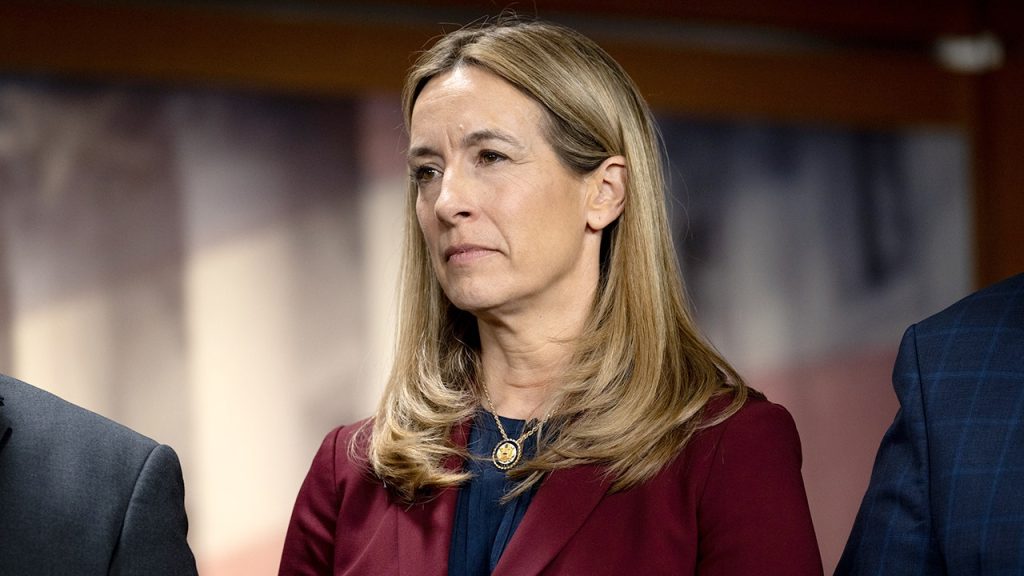Sherrill Promises Legal Action Against Potential Trump Troop Deployment in New Jersey
Democratic New Jersey gubernatorial candidate Mikie Sherrill has taken a firm stance against any potential deployment of National Guard troops in the Garden State by the Trump administration, pledging legal action should such a scenario unfold. During a recent town hall event broadcast live on Univision 41 Nueva York, Sherrill responded to a question from a Venezuelan immigrant whose family had fled the Nicolás Maduro regime. When asked how she would respond if President Trump deployed federal troops to New Jersey, Sherrill, drawing on her background as both a Navy veteran and former federal prosecutor, declared she would immediately challenge such action in court. “American troops should not be on the streets of our country,” she stated, noting that military deployment should be limited to extreme situations like insurrections or national crises, as soldiers aren’t trained for standard policing duties that local law enforcement handles.
Sherrill’s commitment to potential legal action reflects growing tensions between state leaders and the Trump administration over federal troop deployments. “As governor, should Trump try to deploy troops on our streets, I would be very opposed to that. I’d immediately take him to court and demand that he stop this – because I think it’s illegal – and ensure that here in New Jersey, people are kept safe,” she explained during the town hall, where audience members posed questions in Spanish while Sherrill responded in English. This stance places her among several state and local officials across the country who have expressed concerns about federal intervention in local matters, particularly regarding law enforcement and public safety issues.
The context for Sherrill’s comments lies in President Trump’s actions since returning to office in January, when his administration began sending or threatening to send federal troops to nearly a dozen cities, including Baltimore, Los Angeles, and Memphis. The Trump administration has characterized these locations as crime-ridden and dangerous, justifying federal intervention as necessary to restore law and order. These deployments have sparked significant controversy nationwide, with critics arguing they represent federal overreach and potentially exacerbate tensions rather than resolve them. Sherrill, currently representing New Jersey’s 11th Congressional District, is running against Republican Jack Ciattarelli to replace term-limited Democratic Governor Phil Murphy.
Similar resistance to federal troop deployments has emerged in other states, most notably in Illinois, where officials have sued the Trump administration to prevent National Guard troops from being sent to Chicago. This legal challenge followed a federal judge’s decision to block guard deployment in Portland, Oregon. Last month, another significant legal development occurred when a federal judge ruled that the Trump administration had “willfully” violated federal law by deploying Guard troops to Los Angeles earlier this year during protests related to immigration raids. These legal battles highlight the constitutional questions surrounding the president’s authority to deploy military personnel for domestic operations versus states’ rights to manage their own law enforcement affairs.
The debate over federal troop deployments touches on fundamental questions about federalism, public safety, and appropriate responses to civil unrest. While the Trump administration maintains these deployments are necessary security measures to combat violent crime, critics, including Sherrill, argue they represent an inappropriate militarization of civilian spaces. As a former military officer herself, Sherrill’s perspective carries particular weight when she suggests that using military personnel for civilian policing creates a mismatch of training and purpose. Her position reflects broader concerns among many elected officials that such deployments could potentially escalate tensions rather than reduce them, particularly in communities already experiencing strained relationships with law enforcement.
As the New Jersey gubernatorial race continues, Sherrill’s stance on this issue clearly distinguishes her approach to state sovereignty and federal relations from that of her Republican opponent. The controversy highlights how national politics increasingly influence state-level elections, with candidates needing to articulate clear positions on how they would navigate conflicts between state and federal authorities. Whether this issue will significantly impact voter decisions remains to be seen, but it underscores the complex interplay between different levels of government in addressing public safety concerns. For residents of New Jersey and other states where similar tensions exist, the outcome of these debates could have meaningful implications for how law enforcement is conducted in their communities and the extent to which federal forces might be involved in local matters in the years ahead.















